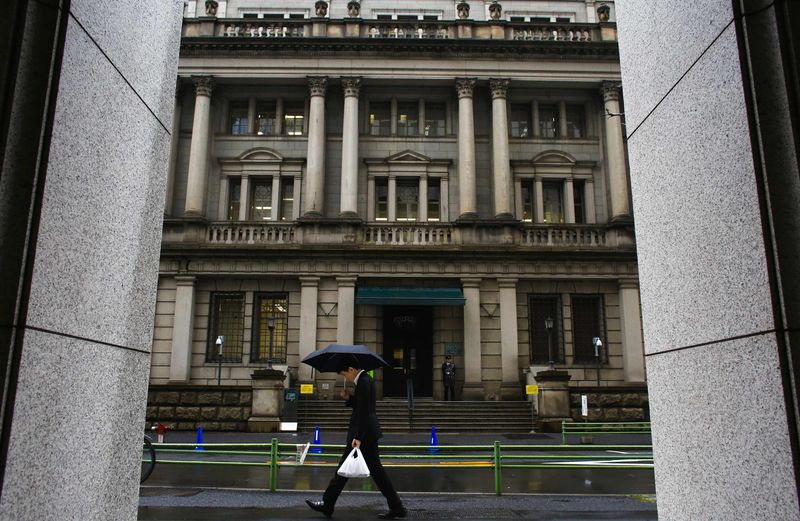By Leika Kihara
TOKYO (Reuters) - Bank of Japan policymakers are sending a concerted signal to investors that they see no need to expand their already-massive monetary stimulus for a second time in response to a slowdown in inflation driven by the fall in oil prices.
Six of the BOJ's nine board members, including Governor Haruhiko Kuroda, went public in the past two weeks to push the message that, while they expect inflation to grind to a halt or even fall in coming months, they remain hopeful that a pick-up in consumption will rekindle consumer prices down the line.
While there was an element of coincidence in the cramming of the events, the fact the fragmented board is speaking with a single voice suggests a carefully-prepared campaign to correct market misconceptions that a temporary slowdown in inflation alone could trigger more monetary firepower.
It also underscores reservations many in the BOJ feel about expanding further an already radical stimulus programme, say sources familiar with the bank's thinking.
"If a positive economic cycle remains intact, there's no need to rush into action," one source said, speaking on condition of anonymity.
There is still near-consensus in the market that the central bank will ease again some time this year, as oil price falls push inflation further away from its ambitious 2 percent target.
"The BOJ may consider price declines as temporary and expect inflation to accelerate from next year on. But I doubt if they can sit still knowing that prices will be falling in the coming months," said Hiroshi Watanabe, senior economist at SMBC Nikko Securities, who predicts the BOJ will act in April.
"Falling prices will push up real interest rates, shattering the transmission channels of the BOJ's stimulus programme needed to boost private consumption and capital expenditure."
Some BOJ officials admit that they have only themselves to blame. The central bank justified its surprise easing in October as aimed at preventing oil price falls, and a subsequent slowdown in prices, from hurting inflation expectations.
That left markets with the impression the bank would jump on the first signs of weakening inflation, regardless of what is behind the slowdown, and so encouraged a preoccupation with monthly inflation data.
"The BOJ may have played up the oil factor too much. It is now emphasising that what's important is a broader price trend," said another source familiar with the debate within the bank.
SPENDING THE KEY?
Indeed, officials who drafted the speech Governor Kuroda delivered on Feb. 27 focused on explaining why the central bank would not respond to oil price moves by themselves.
Hiroshi Nakaso, one of Kuroda's two deputies who supported last October's close-vote decision to ease policy, waded in on Monday to say the key was not how oil prices affected headline inflation, but how they influenced inflation expectations.
Board members Takahide Kiuchi and Koji Ishida, who voted against October's easing, also preached the benefits of the lower cost of oil and stressed that the BOJ should not ease just to hit the inflation target by a set time.
When it first deployed its unprecedented programme of aggressive asset purchases in April 2013, the BOJ said it aimed to hit its inflation target and banish deflation in roughly two years - a deadline it looks certain to miss by a wide margin.
The bank agrees with the dominant market view that consumer inflation will stagnate, and may even slide, until around August, as the effect of the oil falls since last year persists.
But it sat tight in January, even as continued oil price falls forced it to sharply cut its core consumer inflation forecast for the next fiscal year to 1.0 percent, and appears determined to hang tough.
Stripping out the effect of last April's sales tax hike, annual core consumer inflation - which excludes fresh food but includes oil costs - hit 0.2 percent in January and is set to slow further in coming months.
Some in the BOJ thus feel the bank may have to cut its inflation forecast again at a semi-annual review on April 30.
But it prefers to hold fire for now, hoping that inflation will accelerate in the latter half of fiscal 2015 as oil prices stabilise and companies boost wages to lure employees in a tightening job market.
A closer look at the BOJ officials' comments suggests that the trigger for further easing may be less about oil price moves, and more about the strength of private consumption.
While BOJ officials are optimistic on the economic outlook due to a pick-up in exports, some point to disappointingly weak household spending as a soft spot in an economy barely crawling out of recession.
"There's uncertainty on how much capital expenditure and private consumption will rise, even if corporate revenues and real income improve," Sayuri Shirai, among the most pessimistic board members on the economy, said on Tuesday.
